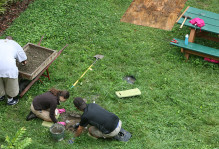Community and Partnership Revisited
With apologies to my SOMOS and DASV colleagues, I begin this post with an excerpt from a letter I wrote to the team when we returned. There is a theme that I want to elaborate, and I hope to deliver on a promise to recognize the exceptional work done by SOMOS team members.
We struggled this year again, and we will struggle for years into the future with enacting partnership. What must we expect of ourselves? What can/must we expect from our partners? At a critical moment of confusion, there were suggestions that we should, automatically, defer—because we are “outsiders.” I beg to differ. We are partners. I’ve said before that we will never have an “insider’s” understanding of the lived experiences and culture of the community and its residents. But that’s not the goal; the goal is to understand as fully and empirically as we can what we need to know to be effective partners. Should we act on the suggestion of some in the community that a “wrap up” meeting is important at the end of the week? Or, should we defer to those who worry that they have no resources, that we have the resources and therefore we should get on with helping? Recognizing the difficulties and the inconveniences, we asked the community to come together for one hour on a holiday that was filled with other obligations. Seems like a small enough matter, but it was a noticeable step forward. We will struggle with decisions like these for years to come, in part from our good intentions to help and to respect. We must be careful not to allow our good intentions to overwhelm our guiding principles, in this case that partnership means commitment and effort on both sides.
Do not confuse this point of view with “tough love.” There is nothing accusatory about the idea of partnership. And this is not the usual notion of exchange: “I’ll do this if you’ll do that.” In some ways it is even simpler: “I can do this only if you will do that.” We worry continuously about “top down” strategies, about imposing our solutions on their problems—and it is right to do that. Those concerns sometimes can be paralyzing—not least because they mobilize dichotomies, almost always, false dichotomies. They reflect imagined objectivities that simplify and reduce—and distort.
In the usual objectivist way of understanding, there is no community mandate, no one most important problem, no singular preferred strategy. Rather, there are shared and shifting understandings about concerns and solutions. There are moments when there is sufficient presence among residents that the community appears to speak with some singular voice. Don’t be deceived: the singularity can be disaggregated by any number of variable forces. And, this is crucial: Recognize that our work has helped to shape that moment. When we speak of “community building,” we do so in part because our efforts to understand also shape what constitutes community and what constitutes understanding.
Does this belie the confidence we’ve put in community-building, in community-capacity, in community-based, participatory development? Not at all. No one said that this would be easy or that we would find and deploy the silver bullet. It is rather to caution against reductionist understandings and simplistic solutions. Partnering means sharing some vision of problems, goals, objectives, and strategies. We are engaged less in discovery than in construction. We ask questions, systematically, thoughtfully, and repeatedly, because we want answers to shape our understandings. In the process, our questions shape shared understandings among those who answer. It is the first step in partnership.
And so to the kudos: . . . . . next blog post!


No comments.
Comments are currently closed. Comments are closed on all posts older than one year, and for those in our archive.